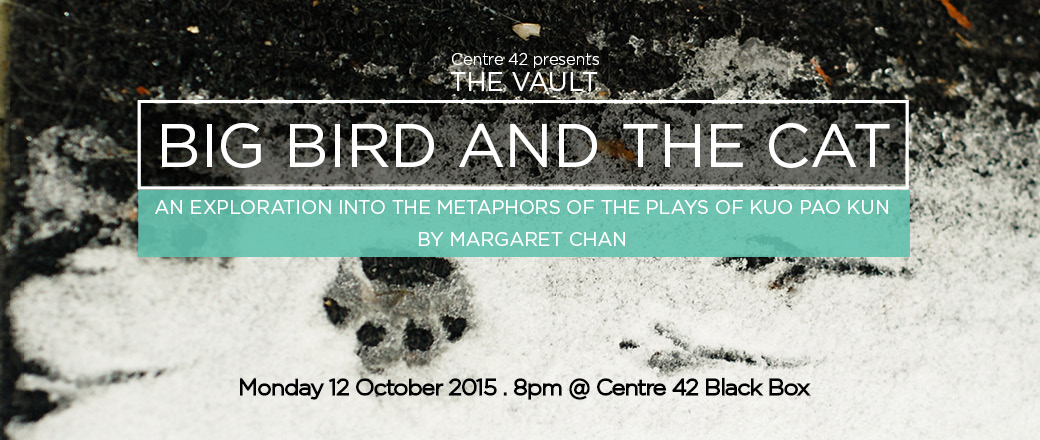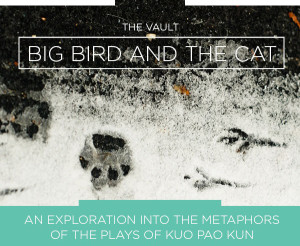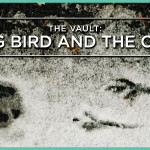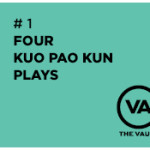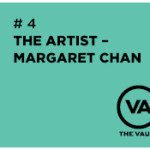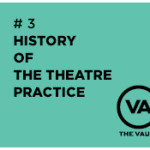In this seminar-styled presentation, Margaret Chan shares her investigation of Kuo Pao Kun’s metaphors of Big Bird and the Cat. Features readings from Kuo Pao Kun’s plays by Ali Khan, Margaret Chan and her students from the Singapore Management University course THAR003: Nathan Al Taei, Terri Tan, Lou Shixun, Tai Jie Xin, Phua Jie Yun and Hiroshi Kondo. The 70-minute Lecture-Performance has been repackaged into an 8-part video recording.
Margaret was tasked by Kuo in the last year of his life to produce The Eagle and the Cat. He told her the play was his most important, even though it had not received much attention. To Margaret, the play is clearly autobiographical, a precious capsule in which Kuo shares his beliefs that fuelled his vocation as a writer of theatre. She proposes that there are no clues but clear meaning in the tropes of “Big Bird” and “Cat” which appear in this script.
Join Margaret Chan in her investigation of Kuo Pao Kun’s metaphors of Big Bird and the Cat. Features readings from four of his plays by Ali Khan, Margaret Chan and SMU students – The Eagle and the Cat (Chinese 1990, English 1995), The Evening Climb (1992), Descendants of the Eunuch Admiral (1995), Mama Looking for Her Cat (1988).
REGISTRATION
Monday, 12 October 2015
8pm @ Centre 42 Black Box
Admission is FREE.
About the Playwright:
Kuo Pao Kun (1939 – 2002) is an important figure in Singapore’s cultural history whose life and work incontrovertibly shaped the local theatre landscape. He was a prolific playwright whose oeuvre spanned linguistic, cultural and artistic boundaries. His iconic plays have been performed multiple times across many different countries and translated into many languages. He also founded many of today’s prominent and enduring arts institutions, most notably The Theatre Practice, The Substation, and the Intercultural Theatre Institute.
About the Plays
The Eagle and the Cat was first staged in 1990 for the opening of The Substation. It is a monologue that tells a surreal tale of a man who turns into a cat. The Evening Climb premiered at the Singapore Festival of Arts 1992 and is a strange tale of three 70-year-old characters in search of a mythical big bird. Descendants of the Eunuch Admiral is one of Kuo Pao Kun’s most acclaimed works. First staged in 1995, Descendants is a lyrical play based on the ancient mariner Zheng He which comments on the trappings of modern life. Mama Looking For Her Cat is recognised as a ground-breaking play for its use of multiple languages. First premiered in 1988, the play is about a mother, who speaks only Hokkien, in search for her lost cat.
Margaret Chan
Margaret Chan is a familiar face and name in local theatre, television and film. As a pioneering actress in Singapore English-language theatre, she is best known for her iconic performance as the titular matriarch in the monologue Emily of Emerald Hill. She was also a journalist and food critic. Margaret received her PhD in Theatre/Performance Studies from Royal Holloway, University of London in 2002 and is currently an Associate Professor of Theatre Associate Professor of Theatre/Performance Studies (Practice) at the Singapore Management University.
Part 1: Introduction
Margaret Chan introduces the structure of her seminar, as well as her students from Singapore Management University (SMU) who will be reading excerpts from several of Kuo Pao Kun’s texts. She also shares the main thesis of her presentation.
Part 2: The Eagle and the Cat
Margaret goes through the story of Kuo Pao Kun’s The Eagle and the Cat. SMU students Nathan Al Taei, Terry Tan, Lou Shixun and Tai Jie Xin read excerpts from the play.
Part 3: Ruminations on Big Bird
The discussion about the metaphor of big bird from several perspectives, drawing from linguistics and art history to support her claim that the big bird in Kuo Pao Kun’s plays refers to the revolutionary spirit.
Part 4: The Revolutionary Spirit
Margaret argues that Kuo Pao Kun was inspired by the revolutionary writers of China.
Part 5: Ku0 Pao Kun & Lu Xun
Drawing out the similarities between Kuo Pao Kun and Chinese revolutionary writer Lu Xun. SMU student Phua Jie Yun reads an excerpt from Lu Xun’s Medicine.
Part 6: The Stories of Ordinary People
Margaret argues that Kuo Pao Kun’s works (those inspired by the Chinese revolutionary writers) were written in the manner of social realism, in that they often highlighted the plights of ordinary people. She cites The Coffin is Too Big For the Hole and No Parking on Odd Days as prime examples of Kuo Pao Kun’s social realist writing. SMU student Hiroshi Kondo reads an excerpt from The Coffin is Too Big For the Hole.
Part 7: The Writer’s Dilemma
Margaret argues that the trope of castration, surfacing in Kuo Pao Kun’s The Descendants of the Eunuch Admiral and The Evening Climb, signaled Kuo’s dissatisfaction and feelings of helplessness as an artist and writer in Singapore.
Part 8: Mama Looking For Her Cat
Margaret Chan and veteran actor Ali Khan perform an iconic scene from Kuo Pao Kun’s Mama Looking For Her Cat
On 12 October 2015, actress-academic Margaret Chan presented a seminar exploring the metaphors of big bird and the cat in Kuo Pao Kun’s oeuvre and life. The seminar highlighted iconic Kuo Pao Kun plays such as “The Coffin Is Too Big for the Hole” and “Descendants of the Eunuch Admiral”. The seminar featured readings by students from Margaret’s SMU course, and ended with a special performance of an excerpt from “Mama Looking For Her Cat” by Margaret and Ali Khan.
Source: Centre 42 Facebook
.
The Vault: Big Bird and the Cat revisits four of Kuo Pao Kun’s plays, refreshes and retells the stories in them through the eyes of theatre veteran Margaret Chan and in collaboration with SMU students.

